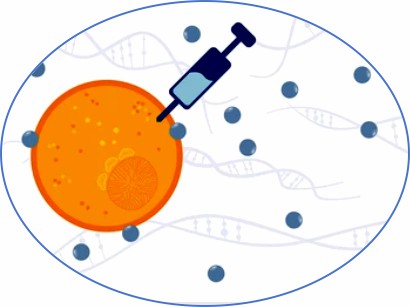Gene Therapy Product Biological Activity Testing
Inquiry
As genomic therapeutic products are diverse and have different functions, it is necessary to design or develop biological activity assessment methods applicable to specific products based on the intended functions of the products themselves and the available assay technologies. CD Formulation, based on our advanced technology platform and professional technical team, can analyze the specific biological activities of gene therapy products according to customer requirements.
Importance of Gene Therapy Product Biological Activity Testing
- Bioactivity testing is essential to ensure the safety and efficacy of gene therapy products.
- Bioactivity testing can help assess the distribution, survival and clearance processes of the product in the body, providing important information for clinical dosage determination, dosing regimens and monitoring programs.
- Bioactivity testing also helps to understand the characteristics of the product relevant to the proposed therapeutic use, including whether the vector can reach the intended target tissue or cell and produce the corresponding biological activity.

Our Services for Gene Therapy Product Biological Activity Testing
Currently, the activity or efficacy of a product is often assessed by changes in cell phenotype or function caused by the expression product of a gene therapy vector transduced into sensitive cells. The development of these activity assays needs to be analyzed based on the function and characteristics of the product, for example, some products can be tested for transduction efficiency or viral activity by quantifying the activity of the expression product, while some products can only be tested for transduction efficiency or product expression by measuring the physical content of the product due to the difficulty of detecting the activity of the product, for example, by western blot, flow cytometry, ELISA and other assays to quantify the expression product. Based on our many years of experience, we can provide efficient and reliable technical support for bioactivity assay according to the characteristics of gene therapy products.
Biological activity assays
The efficacy of a gene therapy product is assessed by biological methods, such as laboratory tests to determine a product's specific ability or potency.
In vitro potency assays
In vitro assays are developed to provide verifiable quantitative data to demonstrate that the vector can transfer genetic material into cells and that the transferred genetic material has the desired biological effect in the transferred cells.
In vivo potency assays
We can also provide early results of potency assays in animal models by measuring the responses generated in animals
Optimization of analytical methods
We optimize each step of the assay, including cell culture conditions, handling of transduced cell lysates and stability tests, as well as functional assay parameters.
Our Platforms for Gene Therapy Product Biological Activity Testing
| Platforms & Technologies |
Content Description |
| Western blot |
Western blotting is a powerful technique to detect specific proteins within a complex mixture. It involves the separation of proteins by gel electrophoresis, their transfer to a membrane, and subsequent detection using specific antibodies. |
| Flow cytometry |
Flow cytometry is used to analyze the physical and chemical characteristics of cells or particles in suspension. It employs specific antibodies that can be conjugated to fluorescent dyes to detect markers on or within cells. |
| Enzyme-linked immunosorbent assay (ELISA) |
ELISA is a plate-based assay technique designed for detecting and quantifying soluble substances such as proteins, peptides, antibodies, and hormones. ELISA can be used to quantify the amount of therapeutic protein produced by gene therapy in various biological samples. |
Highlights of Our Gene Therapy Product Biological Activity Testing
- We perform strict quality control on all raw materials to ensure the accuracy of our results.
- We continuously optimize experimental conditions to reduce experimental variation and improve the consistency of results.
- We have standard operating procedures to ensure that all of our experimental steps are performed according to established protocols and to minimize human error.
- We utilize various advanced technological methods to achieve highly sensitive assays and ensure accurate and reproducible results.
Published Data
Technology: Potency testing of gene therapy products
Journal: Front Med (Lausanne)
IF: 5.1
Published: 2023
The potency of biological medicinal products is a key measure of their biological activity and is crucial for reflecting their Mechanism of Action (MoA) and correlating with clinical responses. For timely product release, robust, quantitative in vitro assays are preferred over in vivo models. Potency assays are also essential for comparability studies, process validation, and stability testing. Cell and gene therapy products (CGTs), which include nucleic acids, viral vectors, and viable cells, present unique challenges in potency testing due to their complexity, often requiring a combination of methods to assess multiple functional mechanisms. For these products, assessing viability and cell phenotype is important but not sufficient for potency, additional factors like transgene expression, target cell interaction, and transduction efficiency must be considered. Genome editing and other cell manipulations can further complicate potency testing. Non-clinical studies can support potency testing, particularly for comparability. However, a lack of potency data may necessitate reliance on clinical efficacy data to address issues in potency testing, such as unclear comparability between clinical batches. The article discusses these challenges and provides examples of assays for different CGTs/ATMPs.
CD Formulation is an industry leader in gene therapy product bioactivity testing and has served numerous investigators in the gene therapy research field for many years. If you are interested in us, please feel free to contact us.
References
- Salmikangas P, et al. Potency testing of cell and gene therapy products. Front Med (Lausanne). 2023, 10:1190016.
Related Services


